#meaning of “Insha'Allah”
Explore tagged Tumblr posts
Text
it's seriously disturbing how "normal" it has become to open social media and see pictures and videos of dead people..
#if someone told me three months ago that i would open instagram to see videos and pics of dead people#i wouldn't believe it#by normal i mean you open the apps and just expect to see it#insha'Allah this will stop#palestine#free palestine#gaza#free gaza#🍉
16 notes
·
View notes
Text
it's so funny to me how non-muslim westerners with minimal knowledge about islam use insha'Allah/alhamdullallah/masha'Allah like sometimes they'll put one of them in a sentence and I'd think no bestie wrong prayer!!!
#I mean this in a very light hearted way it's just hilarious#'insha'allah they found him' no!! Wrong one!!!#very reliable posts
1 note
·
View note
Text
dhul hijjah - a second chance after ramadan ♡
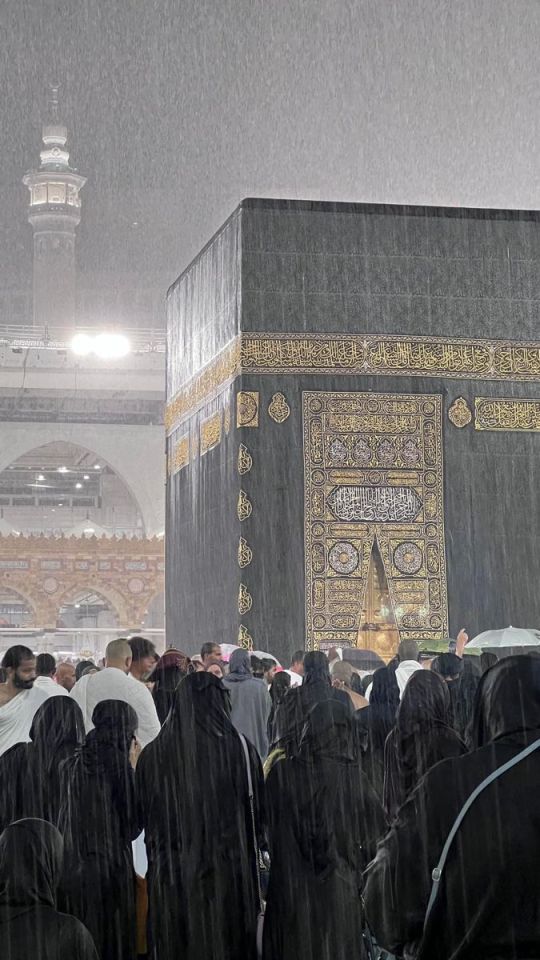
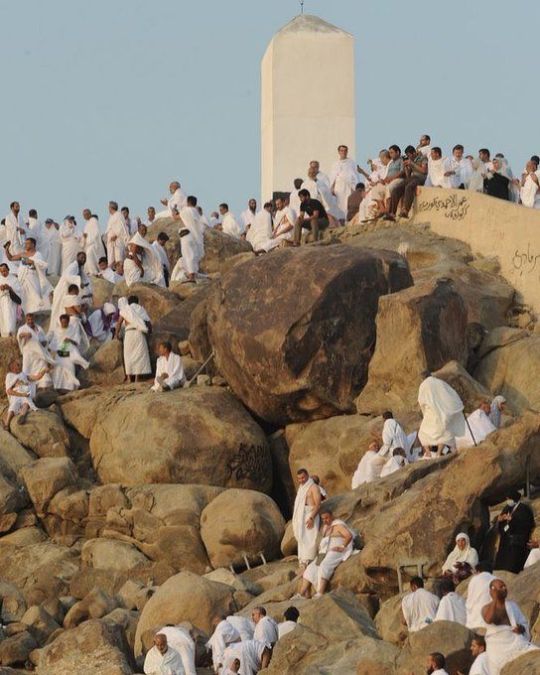
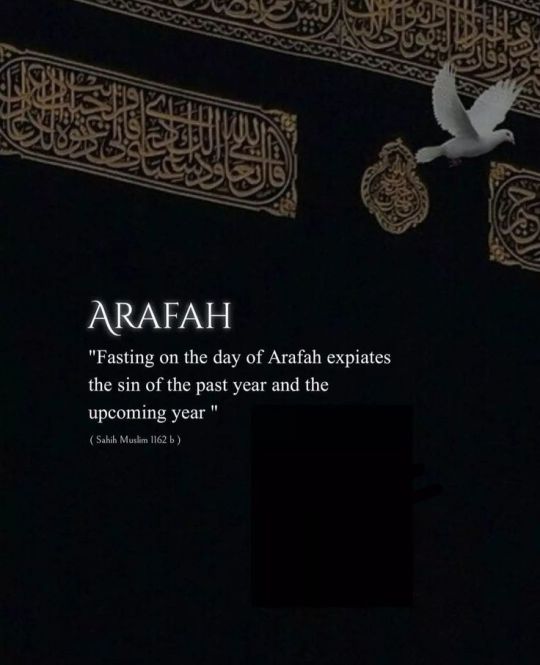
what is dhul hijjah?
meaning 'the month of the pilgrimage' as many muslims go on hajj in this time, dhul hijjah is the twelfth and final month of the islamic year. the first ten days of this month are the best days of the entire year. yes - even better than ramadan:
it was narrated by Ibn Abbas that the Prophet ﷺ said: “There are no days during which righteous deeds are more beloved to Allah than these days,” meaning the (first) ten days of Dhul- Hijjah" - Sunan Ibn Majah 1727
these ten days encompass the day of Arafah, Hajj, and Eid ul-Adha
this month, we remember prophet Ibrahim (as) and how he was told by Allah to sacrifice his son, Hadrat Ismail (as). he took hadrat Ismail (as) on top of mount Arafat for the sacrifice, and just as he was about to sacrifice Ismail (as), Allah told him to stop as He was only testing him to see if he was truly obedient and willing to sacrifice everything for Allah's sake. the 9th day of dhul hijjah is the day of Arafah, commemorating this event.
we also remember how Allah told Ibrahim (as) to leave Ismail (as) and his wife, Hadrat Hajar, in a desert - which, today, is present day makkah.
this month is therefore about obedience, surrender and sacrifice for Allah سُبْحَٰنَهُۥ وَتَعَٰلَىٰ.
depending on the sighting of the moon, dhul hijjah is expected to begin friday 7th june!
what to do in these first ten days?
even if you're not going for hajj, you should use these blessed days for extra righteous deeds and worship, especially on the day of arafah - the 9th day (which falls on 16th june this year, Insha'Allah) - the day before eid.
FASTING
it is a sunnah to fast the first 9 days of dhul hijjah. if you won't fast all 9 days, then it's best to prioritise the 9th day, the day of Arafah. this is because the prophet ﷺ said: “Fasting on the Day of ‘Arafah expiates for the sins of the year before and the year after.” (Sunan Ibn Majah 1730) however, unless you're going for hajj and you're actually at Afarah, then you cannot as it's forbidden to fast while on the mountain.
DHIKR
it's extremely important to increase your dhikr in this time. recite the tasbeeh, tahmeed, takbeer and tahleel often: tasbeeh - subhanallah (Holy is Allah) tahmeed - alhamdulillah (all praise belongs to Allah) takbeer - Allah Akbar (Allah is the Greatest) tahleel - laa ilaha ill-Allah (there is no God except Allah) Allah said “remembrance of Allah indeed is the greatest virtue” (29:46) - it brings you closer to Him, you feel more certain in His powers that He can remove any hardship which makes the heart feel less anxious, Allah becomes your Friend, you'll become successful (remember Allah often so you may prosper” (8:46), it cleans your heart, it protects you from harm, Allah becomes pleased with you. it truly is the greatest virtue.
also recite istighfar (astagfirullah) and repent for your sins
the best dua to recite on the day of Arafah itself is:
laa ilaaha ill-allaahu, waḥdahu laa shareeka lah, lahul-mulku wa lahul-ḥamdu, wa huwa ‛alaa kulli shay’in qadeer - (None has the right to be worshipped except Allah, alone, without partner. To Him belongs sovereignty and all praise and He is over all things omnipotent)
OTHER INCREASED ACTS OF WORSHIP
do extra voluntary acts of worship (nawafil, sunnah prayers, duha prayers)
read a lot of Qur'an
listen to the Qur'an more
send many, many salutations to the Prophet ﷺ (durood sharif!)
practice gratitude. what are you thankful for?
pray tahajjud
give sadaqah / donate to a charity. make sacrifices!
be kind!
read translation and commentary of surahs
listen to islamic podcasts/read islamic books to increase your knowledge
memorise a surah
talk to Allah!!!! pray!!!!
try and increase your acts of worship throughout the 9 days and especially on the 9th day, the day of arafah, which is the day before eid! (16th june Insha'Allah, depending on where you are in the world)
10th day - eid ul adha
on the tenth day of dhul hijjah (eid), our beloved Prophet ﷺ used to give Qurbani (a sacrifice) every year to remember Ibrahim (as) almost sacrificing his son for Allah سُبْحَٰنَهُۥ وَتَعَٰلَىٰ's sake. muslims sacrifice animals all over the world to follow this sunnah, and donating qurbani is encouraged for every Muslim who is financially able to do so (this can be done online)

may Allah سُبْحَٰنَهُۥ وَتَعَٰلَىٰ make it easy for us to utilise these blessed and best 10 days to the best of our abilities, forgive us of our sins, draw us ever nearer to Him and allow us to become His best friends, Allahumma Ameen ♡
#islam#dhul hijjah#arafah#muslim#religion#sabrgirl#ramadan#allah#quran#prayers#islamic#muslims#arafat#jummah
192 notes
·
View notes
Text

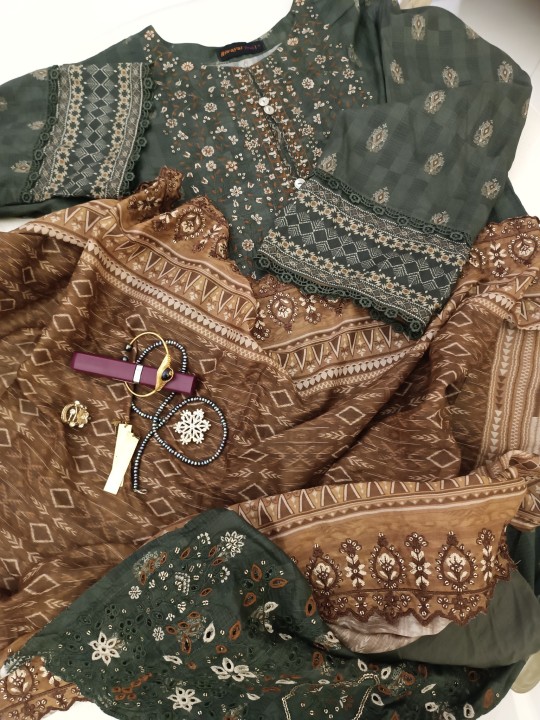
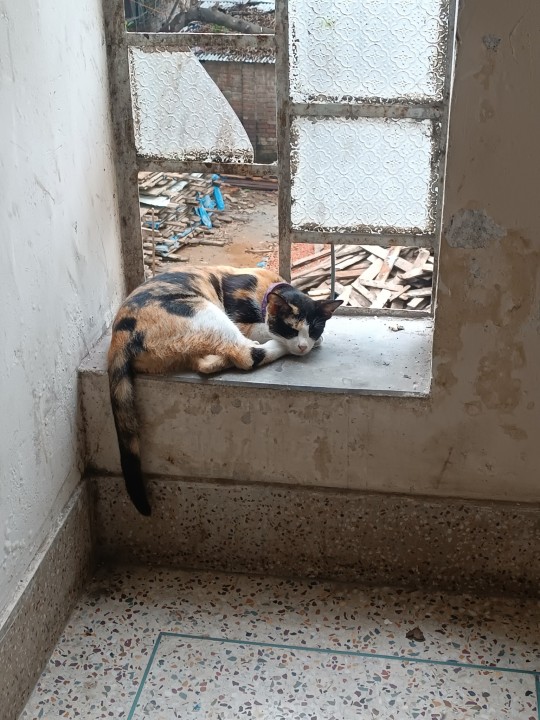
eid vibes
Exam diaries II.III, dop 1/100
Sunday, 15 June, 2025
Next Exam: Sampling Distributions (18.06)
I am both relieved and terrified of my sophomore year finals this year. I need so much more marks for As. ADHD has been rampant lately. I totally lost all joy in studying. Pushing through anyways...
Today's to-do: (insha'Allah)
Pray all 5 prayers F D A M I
Discrete Probability Distributions: pmf, cdf, use, pgf, mgf, mean, variance
Continuous Probability Distributions: pdf, cdf, use, mgf, mean, variance
Generating functions: pgf,pmf,cgf
Distributions function technique of finding distribution of a random variable
Distribution of minimums and maximums
Nothing is easy except for what Allah makes easy and he can make all difficult easy 🤲🏽
Hope you guys have a great time studying ~
#altin posts#studyblr#studyspo#statblr#datablr#study motivation#study inspiration#study session#study hard#100 days of studying#studying#statistics#data science#datascience#stemblr#stem studyblr#women in stem#stem academia
27 notes
·
View notes
Text
Bismillah Al-Rahman Al-Raheem.
Indeed, the Qur'an is filled with verses that offer deep solace and hope, promising that Allah, in His infinite wisdom and mercy, will alleviate our sorrows and transform our hardships into ease. Allah assures us that He is ever-watchful, and nothing in our lives escapes His notice.
"فَإِنَّ مَعَ الْعُسْرِ يُسْرًا. إِنَّ مَعَ الْعُسْرِ يُسْرًا" "So, truly, with hardship comes ease. Truly, with hardship comes ease." Quran 94:5-6
This verse is a divine reminder that after every trial, relief is not just promised once but twice. Your current difficulties, no matter how heavy, will eventually give way to ease and joy. Allah Himself has guaranteed it.
Furthermore, the Qur'an reminds us to stay patient and steadfast:
"يَا أَيُّهَا الَّذِينَ آمَنُوا اصْبِرُوا وَصَابِرُوا وَرَابِطُوا وَاتَّقُوا اللَّهَ لَعَلَّكُمْ تُفْلِحُونَ" "O you who have believed, persevere and endure and remain stationed and fear Allah that you may be successful." Quran 3:200
Patience and reliance upon Allah are keys to success, both in this world and in the hereafter. The people of Jannah are those who bear their trials with faith and patience, knowing that Allah is with them through every hardship.
Moreover, Allah promises that those who trust in Him will never be abandoned:
"وَمَن يَتَوَكَّلْ عَلَى اللَّهِ فَهُوَ حَسْبُهُ" "And whoever relies upon Allah – then He is sufficient for him." Quran 65:3
Trust in Allah means acknowledging that even in the depths of our pain, He is our Protector, and He will take care of our affairs, both in this life and the next. Your struggles will not be in vain if you keep your heart tied to Allah and His guidance.
Finally, for the believers who endure, Allah gives a beautiful glad tiding:
"إِنَّ الَّذِينَ آمَنُوا وَعَمِلُوا الصَّالِحَاتِ كَانَتْ لَهُمْ جَنَّاتُ الْفِرْدَوْسِ نُزُلًا" "Indeed, those who have believed and done righteous deeds – they will have the Gardens of Al-Firdaus as a lodging." Quran 18:107
Yes, you will meet the people of Jannah, insha'Allah, both in this world through righteous companionship and eternally in the hereafter, where your sorrows will vanish, and you will experience endless joy. Allah's promise is true, and His mercy encompasses everything.
Your pain, your patience, and your trust in Allah will lead you to a brighter future, one that may even surpass your expectations. Allah has a plan for you, and His plans are far greater than anything we can imagine. Never give up hope, for you are in the care of the Most Merciful.
27 notes
·
View notes
Note
Hello, I am a human medicine student from Gaza City. I am asking you for urgent help in publishing the link for my family and delivering it to people interested and able to help us. I did not want to do that, but the tragic situation we are living in is what made me have to do this. I feel sad and helpless, after we had Everything, we are now homeless on the streets, we live in a tent next to a dilapidated public toilet and there is sewage, filth and waste everywhere, we sleep on it! We suffer from terrible heat, insects and scorpions, the danger of death, bombs and missiles, in addition to hunger of course, and the danger of pollution and terrible diseases.Especially digestive, respiratory and reproductive! My younger siblings are suffering and very sick. They are terrified of everything, especially scorpions and insects. My father and mother cannot bear it any longer. You have the right to imagine that when you spend your life building for yourself and your children to live a decent life, all of this goes away in the blink of an eye, and now when you reach the age you should To rest in it, you are forced to start over !!? , but the most important thing now is to try to stay alive and protect your children from all the factors of death that surround us! I ask anyone who has humanity or conscience to feel our situation and put himself in our place. How can a person who has lived with dignity all his life accept this? We are dying slowly every day. Please, if anyone can help, even if just a little, do not delay! Your little means a lot to us!
https://gofund.me/5f12ba33
Hello,
I saw your message and immediately had to check the post on your blog because every time I hear about someone on this situation I am horrified and scared for them. I hope you and your family will be safe soon, and that you get the care you need.
I will add your post to a list of fundraisers I've had reach out to me and will keep reblogging.
Insha'Allah you will meet your goal. Palestine and it's people are some of the most amazing, brave and determined and you are one of them. ❤️
God bless you🇵🇸❤️
#palestine#free palestine#gaza#free gaza#israel#gaza strip#genocide#gazaunderattack#israel is a terrorist state#jerusalem
22 notes
·
View notes
Note
First ,i wanted to say that i love that you included marhaba / hello in arabic in your pinned post :-] its something rlly silly of me to say but it always brings me joy seeing arabic anywhere-
SECONDLY MY MAIN POINTING OF ME BEING HERE- JOFFY YOU ARE TOO NICE AND TOO KIND AND YOURE ALWAYS UPLIFTING ARTISTS....... HOW COULD ANYONE HATE YOU ????????? Ill LITERALLY create a rescue team to Anyone who finds you annoying . /silly Exploding you with my mind your support means endlessly to everyone you interact with , mashallah :-]]c
Ahlan wa Sahlan habibi, i just finished a year of arabic classes at uni lol (i lowkey suck at it, didn't divide my time right) so i thought it'd be nice to include
Also THAANK YOU you're too sweet :3. I'm sure there are people who find me annoying and I respect that. My goal here is to uplift and enjoy creators that I enjoy and I always hope that comes across, but to be on the safe side I included in my masterpost that if someone finds me annoying I hope they'll contact me and let me know so I can chill out if they find the joy off-putting or excessive. Insha'Allah nobody needs to but if they do find me annoying, I hope they DO contact me and tell me. The last thing I want is to have upset anyone or made anyone uncomfortable.
Also thank you Kat you're art is amazing and always brings a smile to my face so i'm honoured you followed me back tbh lol <3333
I've been followed by so many more talented people than i ever expected i hope they all know i mean it when i say i love and support them :D
7 notes
·
View notes
Text
Jumu'ah Sohbet: 30 May 2025
In the face of collective family productivity, including our Gaza spiritual family that are in the depths of an unwieldy genocide, and subsequent and more serious world awakening, we return to our family tradition. Yearning Allah's opening into a transformatory means of sustenance for all oppressed people:
Ya Fattah Ya Razzaq
Above: Your Ammu's spiritual hāl (Divine inspiration) as her contribution to your Aunty Sana's Calligraphy Exhibition which infact was her own psychology treatment, successfully prescribed by Allah, Shukran Ya Allah (Divine gratitude)! In the face of personal uncertainty, I yearned Allah's guidance ... essentially, a miracle! Tasbih of Hazrat Fatima pricked my conscience at that moment. I yearned to discover the secret wisdom behind something I never really understood! After Hazrat Fatima had genuinely complained of her struggles to her father. Our beloved Nabi (SAW) confidently prescribed her this spiritual remedy ... The more I recited Subhana'Allah, Alhamdulillah, and Allahu Akbar ... As Khalifa Hazmat explained it, Allah enabled little-old-me to experience Haqqal yaqeen (the truth of certainty) gained through my rediscovered form of Aqim es-Salat (system of Divine connection) through my artistic manifestation of Allah's touch.
Onwards to the maqam (spiritual station) that Anne as our spiritual mother, as well as our other spiritual mentors, inspired in that maddening time:
#1. The beauty of having the rahma (mercy, compassion, and loving-kindness) of a female spiritual leader leading us in this world is her astute ability to enliven our Silsila (spiritual chain and lineage) by recalling how she was blessed with the spiritual intimacy of Hazrat (Revered figure) Ahmed er-Rifai, herself. Thus, reinforcing that ours is a live Tariqa (a Sufi order), where we will meet the whole Silsila, insha'Allah (Divine willing) including all our beloved Anbiya (Prophets, Peace be upon them all!). Subhana'Allah! (Divine glory), I was left flabbergasted and awe-inspired to be truly deserving of this honour, insha'Allah Ya Rabbal 'Alameen (Oh Lord of all creation)!
However, as a true empathetic spiritual mother, she buttressed her wide perspective of the whole by bringing us back into our relative detailed existence. She added that however wonderful our spiritual ancestors are, who reinforced our purposeful existence as we carry their genes into the future. It is our relative experience with Allah that makes a difference in our daily lives. Not where we come from, but who we are.
She poetically declared that the soul is a spectrum, and we all have all the lights of Allah all over. According to what our soul light energy needs at a time, this determines the dosage of our devotion enacted at that time. I loved the agency she provided to our souls over what we are all too accustomed to dealing with in relation to our tricky nafs (lower-selves or egos).
#2. Thereafter, Anne also reflected upon a saying of our most beloved Prophet Muhammad (PBUH). I am so grateful for the Sufic sisterhood that I have been blessed with in my relationship with Dr Ruwaida, who is also my Integrative Healthcare Doctor herself. As she joined me in its contemplation:

Dr Ruwaida's reflection on this Prophetic piece of wisdom is that Allah reveals our internal state to us through what we see in others. When we are able to connect with our deeper selves and we learn to introspect before judging, we begin to see the clues to self correction and self realisation, which plays out in the outer world. I commended her for her compassionate gaze upon the mirror, which went beyond comparative judgment into interrogative introspection.
#3. During our weekly Qur'an Contemplation session with Khalifa Rubina on Sura Saffat, which refers to our beloved Anbiya through the ages of time. Such that when we send Allah's Salaam upon their blessed personalities, Allah shares the Salaam with us. This struck both your Aunty Yasmina and Aunty Sadia to reflect that it implies that we each have a place with Allah and a relationship with Him. That can refer to any of the following spiritual phenomenna:
- Hāl: a unique experience associated with the feeling of transcendence or spiritual awakening.
- Maqam: which refers to a spiritual station or stage that a Sufi must progress through on their path towards Allah. It represents a level of spiritual development and purification, a step in their journey towards mystical enlightenment and union with the Him. We can think of it as a milestone, a "place of residence" or home as Anne identified it.
- Miracle: A miracle refers to an extraordinary and welcome event that is not explicable by natural or scientific laws and is therefore attributed to a Divine agency.
All these latter spiritual phenomenna are therefore accessible to us all as an outcome of our will conjoined with Allah's Divine will and appropriate timing. We must just trust the process in our surrender to Allah. Along with maintaining His consciousness because Allah is in the details of, and the whole of, the circumstance that we face.
In conclusion, as I reflected with your Abbu, Shukran Ya Allah for the privilege that I enjoy as an accident survivor, with sweet time to contemplate on our spiritual essentials ...
2 notes
·
View notes
Note
i keep thinking about you even tho i don’t actually know you but i hope you and your loved ones are safe <3
ohmg, tysm. it means alot.
thankfully both partied have agreed to a ceasefire so insha'Allah we'll all be fine (srs i need to give these exams to get into a good uni)
5 notes
·
View notes
Text
Basic Muslim Transgender And Intersex Quotes:
by Leyla Suhagi/Jagiella
Here I am going to collect quotes that may be related to muslim transgenders and intersexuals in a positive way. The current state of this page is just a basis, more quotes will - insha'Allah - follow in the future. For more Qur'an verses and sayings of the noble Prophet Muhammad (s.a.s.) please check out the other articles on this page!!:
From the Holy Qur'an, Surah 42: 49-50:
"To Allah belongs the dominion over the heavens and the earth. He creates what he wills. He prepares for whom he wills females, and He prepares for whom He wills males. Or He joins together the males and the females, and He makes those whom He wills to be Aqim (in a normal heterosexual way ineffectual; also barren). Indeed He is the Knowing, the Powerful."
From a 1988 Fatwa from Al-Azhar university regarding surgical treatment of intersexuals:
"It is permissible to perform the operation in order to reveal what was hidden of male or female organs. Indeed, it is obligatory to do so on the grounds that it must be considered a treatment."
From Ayatullah Imam Khomeini, Tahrir al- Wasilah II, p.624:
"The change of the sex (from man to woman and vice versa) through surgical means is permissible to transsexuals."
(quoted according to Mohammad B. Ansari, Basel, Oktober 1998)
From Rhazes (Abu Bakr Muhammad b. Zakariya ar-Razi, one of the medieval muslim founders of modern medicine), "Risalah fi l-Ubnah" ("Thesis regarding the passive desire"):
"If the passive (feminine) desire is prolonged, the person affected by it cannot be cured, in particular, if he is obviously feminine and effeminate and loves very much to be like a woman."
From Mrs Hassan Ali Meer, Englishwoman "Observations on the Mussulmans of India", 1832:
" The eunuchs (the hijras) are very much in demand with the aristocracy. They are generally very loyal and very attached to the interests of their employers. They are the favorite confidantes of their masters and mistresses and rarely abuse their confidence. They are admitted at all hours of the day and night in the zenanas (the harem), and often become rich, thanks to the generosity of their masters. many eunuchs at Oudh (Lucknow) have acquired an elevated social position and have had many honours and distinctions bestowed upon them."
🛑 This article was published in Leyla Suhagi's webpage Leyla's Chayhane.
2 notes
·
View notes
Note
Right, I have journaled. I have even picked up therapy. I have prayed to Allah. I have had a haircut and even changed the colour of my hair. I go gym and changing my body and work on myself - mentally and emotionally. I have changed my life around 180degrees. I have even made a sad playlist.
sit in the darkness? What does that mean?
My heart is not open to people but is open to new experiences and opportunities and acquaintances.
Yet I still can’t move on. I get dreams and feelings just like you. Yet I’m stuck.
I might need to do the Tahajjud itikhara combination.
Well done for doing all of that already. That's massive. Im proud of you. Appreciate yourself and all you've done so far.
Sitting in darkness; not literally but metaphorically. You're already doing it. You're prioritising your own development and are allowing yourself to feel all the emotions.
You're already in the darkness.
This will take time. Weeks, months, maybe even years.
Getting over someone is very much case by case. Eg; If you done wrong in this relationship and have guilt, it can take years to get over, or even better, you don't ever get over it but you learn to live with it.. If you did no wrong, you'll get there eventually. Time is the greatest healer. Consistency matters. You will fall and will feel low, but you just gotta pick your shit up and carry on.
Definitely perform Tahajjud and Iskithara. Sometimes just stay in Sajdah, feel the negativity departing your soul. Prepare for Ramadan also, insha'Allah this will be a good one for you.
Feel free to dm me if you want a chat, I don't bite.
2 notes
·
View notes
Text
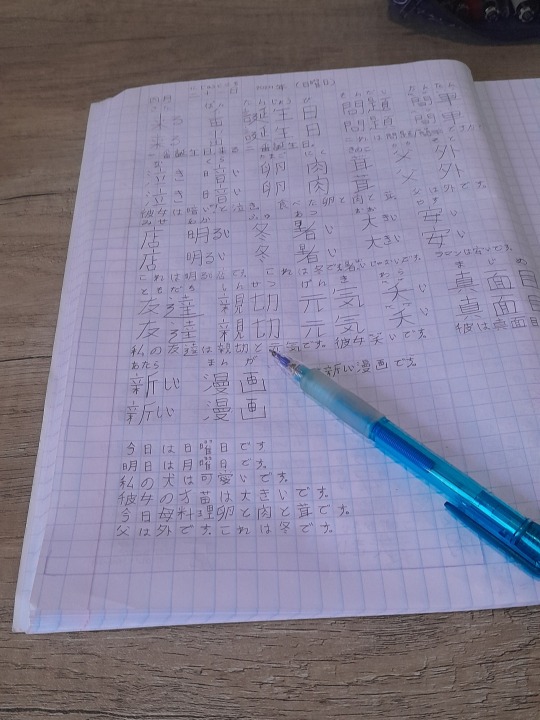
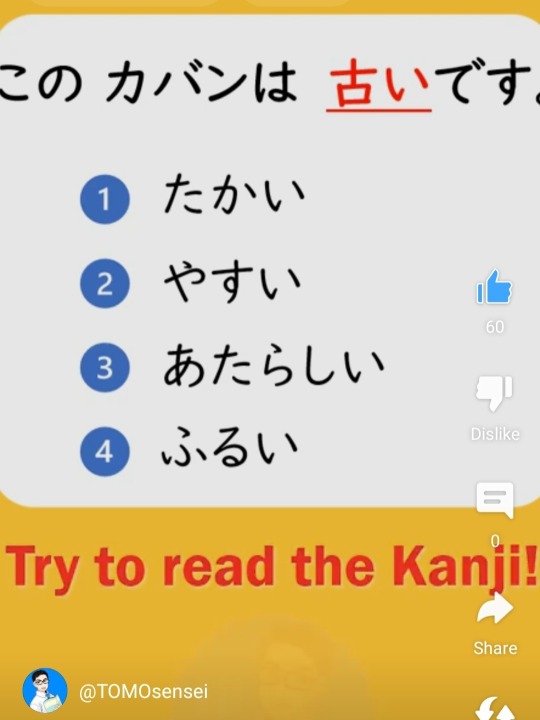
四月 21 日 2024年
Today's kanji practice, with sentences that are very likely grammatically iffy. I'm going to try and actively learn some grammar this week. Also uh, anyone else ever know what the kanji means in their L1 but doesn't know the actual japanese word for it? Because that's what happened here.
Today was a pretty good day. I watched Six The Musical (there is a version on Internet Archive I recommend checking it out) because the songs got stuck in my head. Read a couple more chapters of the Iliad, and I have thoughts about the way women were treated, just jesus christ. Started off the morning reading As You Like It, which insha'allah I will finish tomorrow.
8 notes
·
View notes
Text

Dose # 7 - the stressed letters
This week's lesson will be relatively light. We will be studying the stressed letters.
Šadda شَدَة is the mark of the stressed letters الحُرُوف المُشَدَّدَة and it looks like a cat's mouth ( ⓛ ω ⓛ * ) or a curvy "w", or a lower case omega "ω" in Greek alphabets.

The stressed letter is a "package" of two letters combined into one, in which :
There are two identical letters than come one after the other
The first letter is the "package" has sukoon, the other duplicate letter has a ḥaraka or tanween in some cases.
Whatever the ḥaraka of the second letter is, it will show at the bottom (for karsa or tanween kasr) or on top (all the others).
Here are some examples :
Letter د with šadda + fatḥa دَّ. This is the word "šadda" which means stress
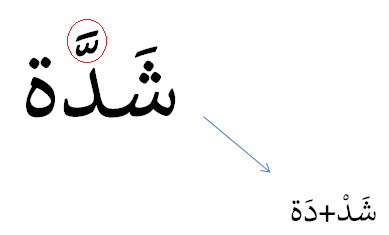
Letter ب šadda + ḍamma. This means blackboard
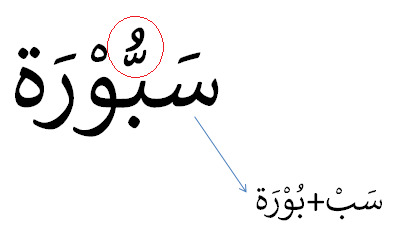
The letter ي (as a semi consonent, since the vowel ي always has sukoon on it) . This word means proud of dignified
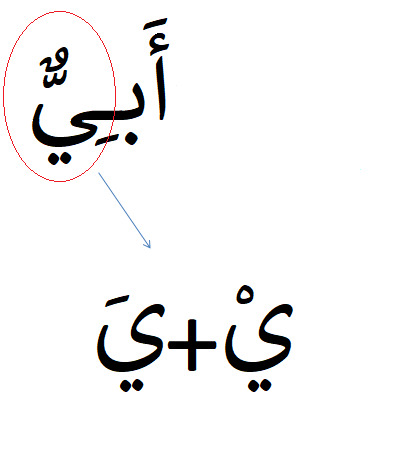
This is an example of a word that has two šadda's, one of the letter م and another on the semi-consonant ي. The meaning of this word is illiterate.
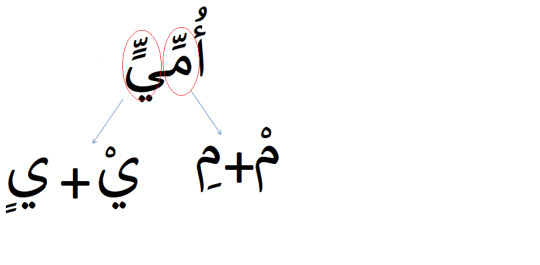
Notice how the šadda has the letter kasra and tanween kasr below it, which all others are right on top of it.
Although the ḥarakat are often removed from regular correspondence, in many instances people will keep the šadda (with no ḥarakas on top)

Pronunciation
Here is an audio to help you see how the stressed letters are pronounced.
To make it easier, break it to its main components.
For example دَّ [Dāl + Šadda + Fatḥa] = [dāl + sukoon] + [dāl + fatḥa]; you will make the sound [dāl + sukoon] then transition to [dāl + fatḥa] and so on.
Here are the audio files, notice how the letters colored in purple and pink are pronounced :
شَــدَّةٌ [šadda]
سَــبُّـورَةٌ [sabbooratun]
أَبِـيٌّ [abiyyun] أُمِّــيٌّ [ummiyyun]

Practice
This is an exercice that I've done before, I'm sharing it here in case you'd like to practice

Homework
Pronounce the following words containing stressed letters.
If you're not comfortable sending a recording, send me how you'd write the words in English transliteration and make sure you show the difference between short and long vowels
رُبٌّ كَـتَّـبَ مَكَـبٍّ ثُـوَّاْرٌ أَرُزَّ

Next week we will continue studying the letters, and we will take another batch insha'Allah

3 notes
·
View notes
Text
dhul hijjah 2025 - a second chance after ramadan ♡


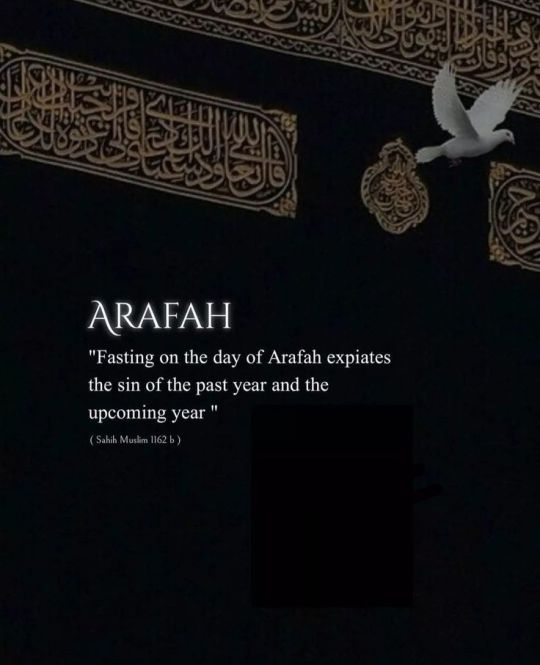
what is dhul hijjah?
meaning 'the month of the pilgrimage' as many muslims go on hajj in this time, dhul hijjah is the twelfth and final month of the islamic year. the first ten days of this month are the best days of the entire year. yes - even better than ramadan:
it was narrated by Ibn Abbas that the Prophet ﷺ said: “There are no days during which righteous deeds are more beloved to Allah than these days,” meaning the (first) ten days of Dhul-Hijjah" - Sunan Ibn Majah 1727
these ten days encompass the day of Arafah, Hajj, and Eid ul-Adha
this month, we remember prophet Ibrahim (as) and how he was told by Allah to sacrifice his son, Hadrat Ismail (as). he took hadrat Ismail (as) on top of mount Arafat for the sacrifice, and just as he was about to sacrifice Ismail (as), Allah told him to stop as He was only testing him to see if he was truly obedient and willing to sacrifice everything for Allah's sake. the 9th day of dhul hijjah is the day of Arafah, commemorating this event.
we also remember how Allah told Ibrahim (as) to leave Ismail (as) and his wife, Hadrat Hajar, in a desert - which, today, is present day makkah.
this month is therefore about obedience, surrender and sacrifice for Allah سُبْحَٰنَهُۥ وَتَعَٰلَىٰ.
depending on the sighting of the moon, dhul hijjah is expected to begin 28th may!
what to do in these first ten days?
even if you're not going for hajj, you should use these blessed days for extra righteous deeds and worship, especially on the day of arafah - the 9th day (which falls on 5th june this year, Insha'Allah) - the day before eid.
FASTING
it is a sunnah to fast the first 9 days of dhul hijjah. if you won't fast all 9 days, then it's best to prioritise the 9th day, the day of Arafah. this is because the prophet ﷺ said: “Fasting on the Day of ‘Arafah expiates for the sins of the year before and the year after.” (Sunan Ibn Majah 1730) however, unless you're going for hajj and you're actually at Afarah, then you cannot as it's forbidden to fast while on the mountain.
if you can't or are unable to fast, you can give an expiation (fidya).
DHIKR
it's extremely important to increase your dhikr in this time. recite the tasbeeh, tahmeed, takbeer and tahleel often: tasbeeh - subhanallah (Holy is Allah) tahmeed - alhamdulillah (all praise belongs to Allah) takbeer - Allah Akbar (Allah is the Greatest) tahleel - laa ilaha ill-Allah (there is no God except Allah) Allah said “remembrance of Allah indeed is the greatest virtue” (29:46) - it brings you closer to Him, you feel more certain in His powers that He can remove any hardship which makes the heart feel less anxious, Allah becomes your Friend, you'll become successful (remember Allah often so you may prosper” (8:46), it cleans your heart, it protects you from harm, Allah becomes pleased with you. it truly is the greatest virtue.
also recite istighfar (astagfirullah) and repent for your sins
the best dua to recite on the day of Arafah itself is:
laa ilaaha ill-allaahu, waḥdahu laa shareeka lah, lahul-mulku wa lahul-ḥamdu, wa huwa ‛alaa kulli shay’in qadeer - (None has the right to be worshipped except Allah, alone, without partner. To Him belongs sovereignty and all praise and He is over all things omnipotent)
OTHER INCREASED ACTS OF WORSHIP
do extra voluntary acts of worship (nawafil, sunnah prayers, duha prayers)
read a lot of Qur'an
listen to the Qur'an more
send many, many salutations to the Prophet ﷺ (durood sharif!)
practice gratitude. what are you thankful for?
pray tahajjud
give sadaqah / donate to a charity. make sacrifices!
be kind!
read translation and commentary of surahs
listen to islamic podcasts/read islamic books to increase your knowledge
memorise a surah
talk to Allah!!!! pray!!!!
try and increase your acts of worship throughout the 9 days and especially on the 9th day, the day of arafah, which is the day before eid! (16th june Insha'Allah, depending on where you are in the world)
10th day - eid ul adha
on the tenth day of dhul hijjah (eid), our beloved Prophet ﷺ used to give Qurbani (a sacrifice) every year to remember Ibrahim (as) almost sacrificing his son for Allah سُبْحَٰنَهُۥ وَتَعَٰلَىٰ's sake. muslims sacrifice animals all over the world to follow this sunnah, and donating qurbani is encouraged for every Muslim who is financially able to do so (this can be done online)

may Allah سُبْحَٰنَهُۥ وَتَعَٰلَىٰ make it easy for us to utilise these blessed and best 10 days to the best of our abilities, forgive us of our sins, draw us ever nearer to Him and allow us to become His best friends, Allahumma Ameen ♡
#had to re-make this post with updated dates for this year lol#islam#dhul hijjah#muslim#quran#allah#sabrgirl
25 notes
·
View notes
Note
7. Do you think you’ll be in a relationship two months from now? Insha'Allah, we will see "الحمدالله الذي تتم بنعمته الصالحات" soon, I'll pray for that 😁😎
15. What good thing happened this summer?
22. Where would you like to travel?
42. If your being extremely quiet what does it mean?
47. Have you ever been high because of lack of sleep? 😂
48. Have you ever been drunk on ice-cream 😂
52. One thing you wish you could change about yourself?
65. Are you hungry right now?
66. Do you like your tumblr friends more than your real friends? Lol 😂
100. How are you feeling?
119. Favourite book?
123. Can you keep white shoes clean? 😂
124. Do you believe in love at first sight?
125. Do you believe in true love?
126. Are you currently bored?
127. What makes you happy?
128. Would you change your name?
132. Who’s the last person you had a deep conversation with?
140. Summer or Winter?
141. Night or Day?
142. Favourite month?
144. Dark, milk or white chocolate?
145. Tea or Coffee?
146. Was today a good day?
147. Mars or Snickers?
148. What’s your favourite quote?
150. Get the closest book next to you, open it to page 42, what’s the first line on that page?
I tried to copy one question but it pasted the whole thing 😭 Pick and choose your questions 😝😁
7. HAHAHHAHHAHAHA I COULD ONLY WRITE SOMETHING LIKE THAT IN ANOTHER DIMENSION, and rationally that's not possible but for Allah nothing is impossible so 🤷🏻♀️ may Allah bless you for your beautiful dua, may Allah give you more than you asked for me 💐
15. Alhamdulilah I had a lot of good time and wasted no time and got every task done
22. Apart from Haramayn, it's Qatar for me
42. That I'm keeping myself from talking cuz I'm either angry or extremely sad
47. When I was with my friends it happened 😅
48. Nah
52. My whole head collection lol
65. Not really, but I could eat something
66. I like yall, maybe I would have liked you more if I met you but I do love my friends
100. Alhamdulilah, fine
123. I can but I like black shoes more
124. Not really, but first impressions matters
125. Mah, idk what to say
126. A little
127. Spending quality time with my loved ones that don't annoy me, for now
128. No
132. Panda anon, you can all witness the conversation lol
140. Summer
141.Day
142. May
144. Dark chocolate
145.coffee
146. Alhamdulilah it was
147. Both boycott but I like Mars
148. I don't have one
Thank you for all the questions :D
4 notes
·
View notes
Text
ALLAH
Meaning "The God" and is derived from the Arabic definite article "Al - The" and "Ilah - God" to "Allah".
Cognates of the title "Allah" exist in other Semitic languages, including Hebrew and Aramaic. Arabic speakers within the Abrahamic faiths, including Christians and Jews, use the word Allah to mean God. This term for God predates Islam, and is clearly not limited to it, as early Christian bibles written in Arabic use the term Allah for God.
So, if you see someone dishonoring the title "Allah" they clearly do so out of ignorance and should be corrected, as insulting God never ends well.
Num 21:5 (JPS) And the people spoke against God,
Deu 31:13 and that their children, who have not known, may hear, and learn to fear the LORD your God,
Az-Zukhruf 43:63 (Yusuf Ali) - “When Isa [Yeshua] came with Clear Signs, he said: ‘Now have I come to you with Wisdom, and in order to make clear to you some of the (points) on which ye dispute: therefore fear Allah and obey me.’”
Insha'Allah means "Allah willing". Therefore it is said when someone expects to do something or promises to do it or when he hopes that something will be realized.
Masha'Allah means "whatever Allah wills". It is chiefly used as an expression of admiration or glorifying Allah for anything with which one is pleased. It is also usable in conditional sense, meaning "whatever Allah wills, will be realized."
Alhamdulillah means "praise be to Allah".

5 notes
·
View notes